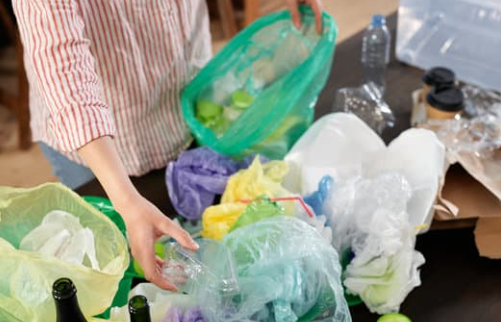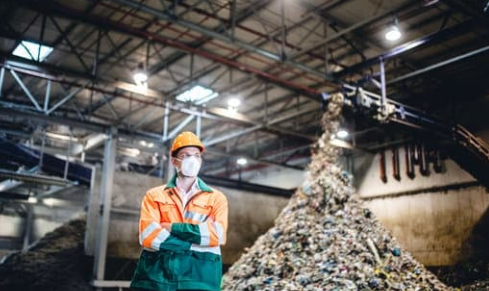Table of Contents
The arrival of summer and its warm weather is great news for the hospitality industry. It brings people out and about and may allow some businesses to expand into the outdoors. At the same time, the summer heat does bring some challenges, such as the need to manage waste effectively to prevent odours. Here are some tips to help.
How Can You Minimise and Manage Your Hospitality Waste This Summer?
Keep your waste to a minimum
 The less waste you create, the less waste you have to manage. This makes your life easier and also reduces your costs. Here are four steps you can take to minimise your hospitality waste.
The less waste you create, the less waste you have to manage. This makes your life easier and also reduces your costs. Here are four steps you can take to minimise your hospitality waste.
Reduce food waste through portion control and menu planning
Menu planning is essential to reducing food waste in the hospitality industry. By planning menus in advance, chefs and kitchen staff can make informed decisions about the quantity and type of food needed for each meal, reducing the likelihood of overproduction. When selecting menu items, they can also consider factors such as seasonal availability, ingredient shelf life, and dietary requirements. This approach can ensure that only fresh and necessary ingredients are used, and any leftover ingredients can be used for future meals.
Portion control is another effective method to reduce food waste. By setting consistent serving sizes, staff can control the amount of food served to customers and minimise leftovers. This can be achieved by using measuring utensils and monitoring customer reviews and feedback to adjust portion sizes accordingly. Staff can also offer customers the option to take home any uneaten food, reducing waste and improving customer satisfaction.
Avoid single-use plastics and packaging
 Plastic waste from single-use items like straws, cutlery and cups is a major contributor to pollution in landfills and oceans. Thus, replacing these disposable items with reusable alternatives can considerably reduce the amount of plastic waste generated.
Plastic waste from single-use items like straws, cutlery and cups is a major contributor to pollution in landfills and oceans. Thus, replacing these disposable items with reusable alternatives can considerably reduce the amount of plastic waste generated.
One way to achieve this is by using durable and reusable crockery, cutlery, and glassware instead of disposable items. Investing in high-quality reusable items that can be washed and reused multiple times can significantly reduce plastic waste. Additionally, this approach can help create a more refined and premium image for the business.
Another way to avoid single-use plastics is by providing customers with alternatives such as paper straws, bamboo cutlery and reusable coffee cups. These items can be offered at an additional cost or included in the overall price to encourage their use. This approach can also attract environmentally conscious customers who prefer businesses that take sustainability seriously.
In addition to avoiding single-use plastics, hospitality businesses can also reduce packaging waste by sourcing products with minimal packaging or opting for recyclable materials. This can be achieved by working with suppliers to reduce packaging or by selecting suppliers that prioritise sustainable packaging options.
Implement recycling programs for paper, glass, and plastic waste
The first step in implementing a recycling program is to identify the types of waste that can be recycled. This may include paper, cardboard, glass, plastic, and metal. Once the types of waste have been identified, the business can establish a recycling system that includes separate bins for each material.
Staff training is crucial to ensure that the recycling program is followed correctly. Staff should be trained on how to identify recyclable materials and how to dispose of them properly. They should also be made aware of the environmental benefits of recycling and encouraged to participate in the program.
Regular monitoring and evaluation of the recycling program are also essential to ensure its effectiveness. The business should track the amount of waste that is being recycled and assess whether the program is meeting its goals. This data can identify areas where the program can be improved and communicate the results to staff and customers.
Hire a waste management service
 Waste management is a significant challenge for the hospitality industry, as hotels, restaurants and other businesses generate considerable waste that requires proper disposal. To address this challenge, many hospitality businesses are turning to waste management services to help them manage their waste more efficiently and responsibly.
Waste management is a significant challenge for the hospitality industry, as hotels, restaurants and other businesses generate considerable waste that requires proper disposal. To address this challenge, many hospitality businesses are turning to waste management services to help them manage their waste more efficiently and responsibly.
Hospitality waste management services provide businesses with a range of services that help to reduce waste, increase recycling rates, and ensure compliance with waste regulations. Waste management professionals can assess a business’s waste output and recommend strategies for reducing waste and increasing recycling rates. They can also provide training and education to staff on proper waste management practices.
Benefits of hiring a waste management service
One of the key advantages of engaging in a waste management service is the potential cost savings for businesses in terms of waste disposal. These services can offer affordable waste management solutions, such as recycling and composting programs. This can help minimise the amount of waste that ends up in landfills. By reducing the amount of waste that needs to be disposed of, businesses can cut down on waste disposal costs and decrease their overall environmental impact.
Aside from cost savings, engaging in a waste management service can also enhance a business’s environmental sustainability and hence its reputation. Businesses can showcase their waste reduction and recycling initiatives to attract customers who prioritise sustainability and demonstrate their dedication to responsible waste management practices.
Another benefit of hiring a waste management service is that it can enhance workplace safety and hygiene. Waste management professionals can provide businesses with the proper equipment and training to ensure that waste is handled safely and hygienically. This can reduce the risk of workplace accidents and illness and promote a safer and healthier workplace environment.
Choosing the right waste management service
Before looking for potential waste management service providers, assessing your waste management needs and budget is important. This will help you determine the type and level of service that you require.
Once you have established your needs and budget, you can begin researching waste management services in your area. This can include checking online directories and reviews, consulting with industry associations or asking for referrals from other businesses in your network.
When considering waste management services, it is important to make a robust but fair assessment of the services provided, pricing and customer feedback. Additionally, it’s highly advisable to ask for references and verify the qualifications of each potential service provider to confirm they are licensed and insured.



